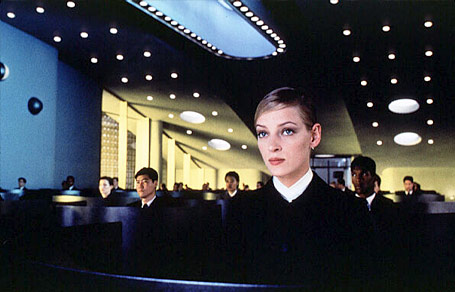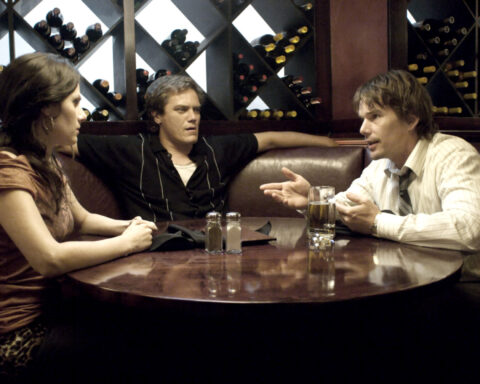
I guess it is only in times of crisis, we begin to see the true nature of cinema and its undoings. There were so many films that made their mark in the past century. But only few who have still stood the tests of undulated time. We have still not challenged the pitchers of time and distance. We feel compelled to understand all the truths we live by revisiting the discrimations of the past. Gattaca is one such film.
If we look back at the beginning of time everything was more blurry. The need for lucidity was surely not commonplace. The zeal with which we live our lives now seemed to be lacking in the past. It is only with time ( such a superfluous commodity ) that we have begun to understand the clarity of our youth. Gattaca pours on these ideas of understated qualities that we come to understand and appreciate only very late in our lives. What if the value of knowing what might lead us to our eventual death be our soul driving force. Death has certainly adapted during our times. It is probably the most liberated being of these warring times. But if death was taken as a commodity what will it leave us with. Gattaca’s twisted premise of death providing us with unrelenting hope is something human. It is an age old idea of subversion of beliefs. But the premise might sound cliched in its character, but it is more of channeling one’s inner demons.
This might be a ode of sorts for this film. But to me it is a realization of what we value the most. Discrimination is still being debated as a disease that seeps into any immature society. The biggest challenge of any society is the understanding of any technology. A spirit of revolution is increasing essential in understanding the finer lines of its effects.
Is this film worth your time? I m not sure if i can answer that. But it does raise several questions that need to be answered. But are these questions a bit too early in its life cycle. We surely don’t want to be converted into propagators of diluted knowledge. It is surely haunting to leave our lives in the hands of papers.
What is it that you want the future to hold for you?
What lasting legacy will you want to impart into its creation?
These questions are similar to asking yourself.
Which book you want to read before everything comes down or do you read? Which sound or thought you would like to take with you before you go? Or do you want a machine to choose that for you as well.
The film challenges the future of prejudices. Sustained life is written off. The unanswerable qualities of depression. The character Vincent is fashioned like internal rebel. His parents see him as a failure just couple of seconds after his birth. They do care for him but our impeded by his imperfections. While their second son is conceived by the latest in genetic engineering. This inequality is something that is played out so beautifully in the water. The two boys swim it out and see who can reach the furtherest without feeling fear. The swim is perhaps the singular most unforgettable moment the film offers. A scene that takes it above the realms the science seems to force upon our daily lives. It give us a glimpse into the undying nature of the human spirit.
I guess it is only in times of crisis, we begin to see the true nature of cinema and its undoing. There were so many films that made their mark in the past century. But only few who have still stood the tests of undulated time. We have still not challenged the pitchers of time and distance. We feel compelled to understand all the truths we live by revisiting the discriminations of the past. Gattaca is one such film.
If we look back at the beginning of time everything was more blurry. The need for lucidity was surely not commonplace. The zeal with which we live our lives now seemed to be lacking in the past. It is only with time (such a superfluous commodity) that we have begun to understand the clarity of our youth. Gattaca pours on these ideas of understated qualities, that we come to understand and appreciate only very late in our lives. What if the value of knowing what might lead us to our eventual death be our soul driving force. Death has certainly adapted during our times. It is probably the most liberated being of these warring times. But if death was taken as a commodity what will it leave us with. Gattaca’s twisted premise of death providing us with unrelenting hope is something human. It is an age old idea of subversion of beliefs. But the premise might sound clichéd in its character, but it is more of channeling one’s inner demons.

This might be an ode of sorts for this film. But to me it is a realization of what we value the most. Discrimination is still being debated as a disease that seeps into any immature society. The biggest challenge of any society is the understanding of any technology. A spirit of revolution is increasing essential in understanding the finer lines of its effects. Is this film worth your time? I m not sure if i can answer that. But it does raise several questions that need to be answered. But are these question a bit too early in its life cycle. We surely don’t want to be converted into propagators of diluted knowledge. It is surely haunting to leave our lives in the hands of papers.
What is it that you want the future to hold for you?
What lasting legacy will you want to impart into its creation?
These questions are similar to asking yourself.
Which book you want to read before everything comes down or do you read? Which sound or thought you would like to take with you before you go? Or do you want a machine to choose that for you as well.
The film challenges the future of prejudices. Sustained life is written off. The diminishing consequences of depression seem to be the lifeline of the protagonist. The character Vincent is fashioned like internal rebel. His parents see him as a failure just couple of seconds after his birth. They do care for him but our impeded by his imperfections. But their second son is conceived by the latest in genetic engineering. This inequality is something that is played out so beautifully in the water. The two boys swim it out and see who can reach the furthest without feeling fear. The swim is perhaps the singular most unforgettable moment the film offers. A scene that takes it above the realms the science seems to force upon our daily lives. It gives us a glimpse into the undying nature of the human spirit.
But revisiting this film is really essential in its calling for mankind. The minimalist art direction leaves us with a somber mood. This is surely not a film for those things it is entertainment. But it is for the discerning viewer who seems to live out their lives without sampling what is around them. But surely being safe will make us less exposed. It will surely create an internal conflict that might tear us apart from ourselves. Vincent is simply voicing his aspirations and his spirit through his actions.
Looking back at what this film stood for. I seem to feel a lot more silent and detached from its thoughts. But this detachment is not something I expected. It is surely not something i would like to indulge myself to write. But the film was like a meditative experience of sorts. It left the bare minimum for us to take from it. The film had an undercurrent of emotions that sort of left us void by the end. A void that is seminal in its writing and execution. I just wish this film won’t disappoint anyone. Write to me otherwise.






[…] are startling images from the film The Cross. Andrew Niccol the man behind the seminal Gattaca. A movie we just adore and I wrote something about it sometime back. His next feature was the […]
[…] the writer and asked her favorite Science Fiction adaptation of all time. She said that she adored Gattaca and that has certainly spelled trouble for the great director Andrew Niccol. He has humbly taken up […]
[…] in science fiction for quite some time. I have extensively written about Gattaca in my very first post. Now there is another film in the pipeline called I’m Mortal. It will be set in the not too […]